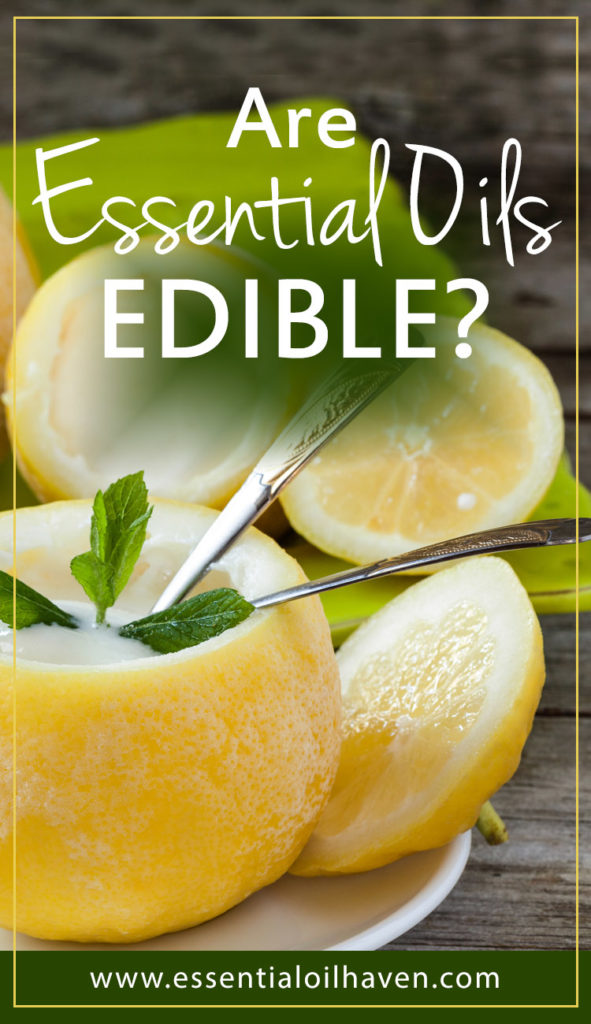 It’s been long on my mind to write an article about ingesting essential oils safely. There is a lot of marketing and information going around the internet about essential oils’ internal use – including recipes, DIY recipes and recipes outlining dietary benefits of essential oils.
It’s been long on my mind to write an article about ingesting essential oils safely. There is a lot of marketing and information going around the internet about essential oils’ internal use – including recipes, DIY recipes and recipes outlining dietary benefits of essential oils.
But, I’ve found that people are still left wondering whether or not certain brands or types of essential oils are safe to eat.
The biggest concerns I’ve heard and want to address in depth, are:
This post contains affiliate links, which means if you make a purchase through these links, I may receive a small commission at no extra cost to you. Read my full disclosure policy here.
- Can I eat essential oils? Should I?
- Which brands of essential oils are safe to ingest?
- Who doesn’t endorse ingesting essential oils
And then, of course, there are a few side notes and other valuable information to each topic – but in essence, this article will address these top 3 questions.
What is in an Essential Oil?
Essential oils are extremely concentrated natural essences and can quite often be a lot more powerful than expected. Even though a drop of oil might not look like much, it can be extremely potent in its effect. Please be aware of this fact always so that we can prevent misuse of precious oils – all the while ensuring you get to enjoy the maximum possible benefit from them.
Can I eat Essential Oils?

In the United States, the Food and Drug Administration office (FDA) is the agency that protects and promotes public health through the control and supervision of food safety – including dietary supplements, drugs and cosmetics. However, since essential oils at large are neither a drug, cosmetic, or dietary supplement, there is really no one category for the FDA to approve or stamp the use of essential oils in general.
As far as I could find out, the categorization of whether an essential oil is deemed a “drug”, “cosmetic” or “dietary supplement” depends on how its use is being advertised. In 2014, Young Living Essential Oils actually received an official warning letter from the FDA, basically slapping their fingers for making strong health benefit claims that would usually have to fall under the “drugs” regulatory act, but the essential oils didn’t go through that approval process and were therefore in violation of the rules. Of course, Young Living has since made all of the necessary changes to remain in compliance.
Further to note, there is also the clause of essential oils being safe “for their intended use”. If you read up on what is actually implied by “intended use” on the FDA website¹, it is also again an area that leaves a lot of room for interpretation or marketing from essential oil brands, websites, and social media channels.
That being said, some brands definitely do advertise that their products are safe for internal use, and I will include them here for easy reference.
Just know that if you do ingest these oils, you are placing your trust in that company, their integrity and marketing ethics – and not in an officially approved safety stamp.
Which Brands of Essential Oils are Safe to Ingest?
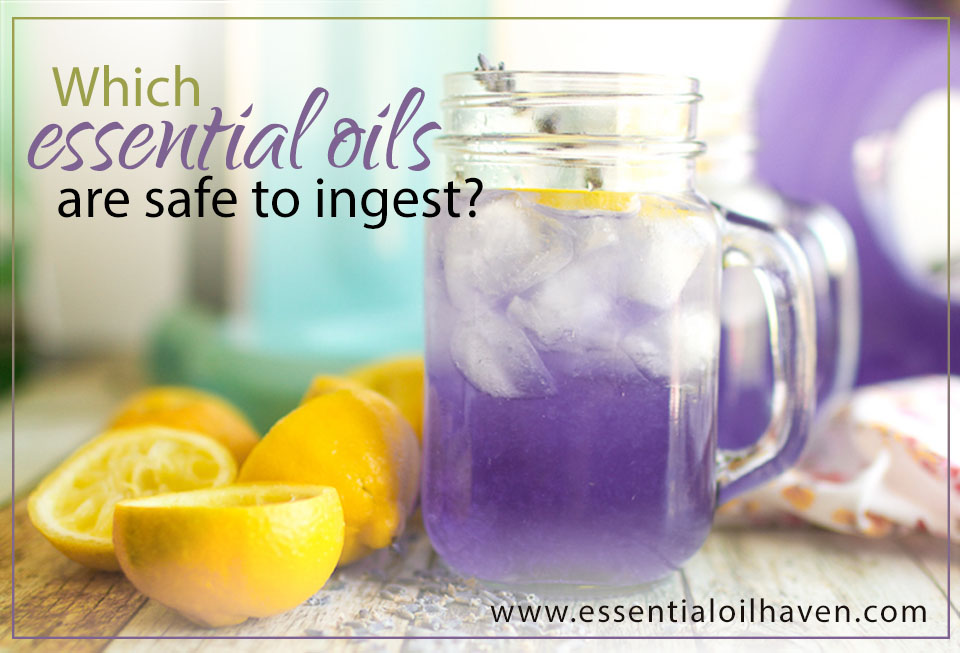
To repeat a summary of the information above, whether or not internal use is ok, is self-proclaimed information. These statements are not approved by the FDA and in my opinion – should be taken with a grain of salt. Use at your own risk. Good marketing should not replace personal judgment nor medical treatment when indicated. Essential oils are not intended to diagnose, treat, cure, or prevent any disease. Always talk to your health care provider or naturopathic physician about the use of essential oils.
Young Living Vitality™ Oils
Young Living has always been at the forefront of pushing the use of essential oils internally. All of their oils comply with a Seed to Seal® promise, basically stating that all aspects of the oils production are controlled and monitored under their quality standards. However, Young Living recently created the Young Living “Vitality™” label to help further and very clearly distinguish aromatherapy oils from oils intended for dietary or culinary use. Look for the label “Vitality™” on any Young Living bottle, and this means they suggest safe internal use for that particular oil.
Popular oils available in Vitality are Peppermint, Lemon, Orange, Lavender and Thieves.
Young Living Essential Oils Full Brand Review
doTERRA Essential Oils
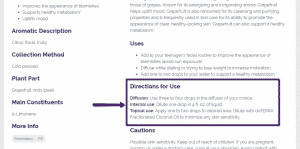
The doTERRA website lists guidelines on how to use essential oils internally. This is an example of Grapefruit.
The essential oil company doTERRA also openly advocates for the ingestion of essential oils in their “how to use essential oils” guide on their website. They advertise using essential oils in cooking and baking to replace dried or fresh herbs and spices, or using them in water or other drinks as dietary supplements.
All doTERRA essential oils include directions on how to use each oil internally. You can find the instructions on their website, on each page for the single essential oil (Example: Grapefruit Essential Oil here).
doTERRA advises that you strictly follow the dosing recommendations according to the labels, and any other professional or medical recommendation you’ve been given for your individual health.
doTERRA Essential Oils Full Brand Review
Miracle Essential Oils
Miracle Essential Oils is another brand that very openly promotes internal use of their essential oils. If you click”How to Use” on their website, you will see a paragraph on how their oils are recommended for dietary use.
I’ve also found this support desk ticket with an answer from a Miracle Essential Oils staff member, directly stating their oils are safe for internal use.
Unfortunately, I don’t see any way that this information is clearly stated on each individual essential oil bottle. The website and online store does have a nice icon for dietary use, but what you basically have to do, is shop in the MEO online store, and look for that “Dietary Use” icon, and read the description to help you see that any particular oil of choice is good for adding to your food.
Miracle Essential Oils Full Brand Review
Jade Bloom Oils
You can safely ingest some oils from Jade Bloom Essential Oils. They are 100% pure but with that, also very potent. Please always follow proper dilution recommendations. Also consider special circumstances such as pregnancy, age, or other prevailing conditions you may have.
To find out which exact oils you can ingest, go to the Jade Bloom Official Oil Guide here. Click on “Oils” to see the index of all the oils they carry. Select the oil in question, and scroll down in the description until you find the Usage Instructions section.
If no instructions are given for internal use, this means your selected oil is not rated safe for ingestion. Choose another oil.
Who Doesn’t Endorse Ingesting Essential Oils
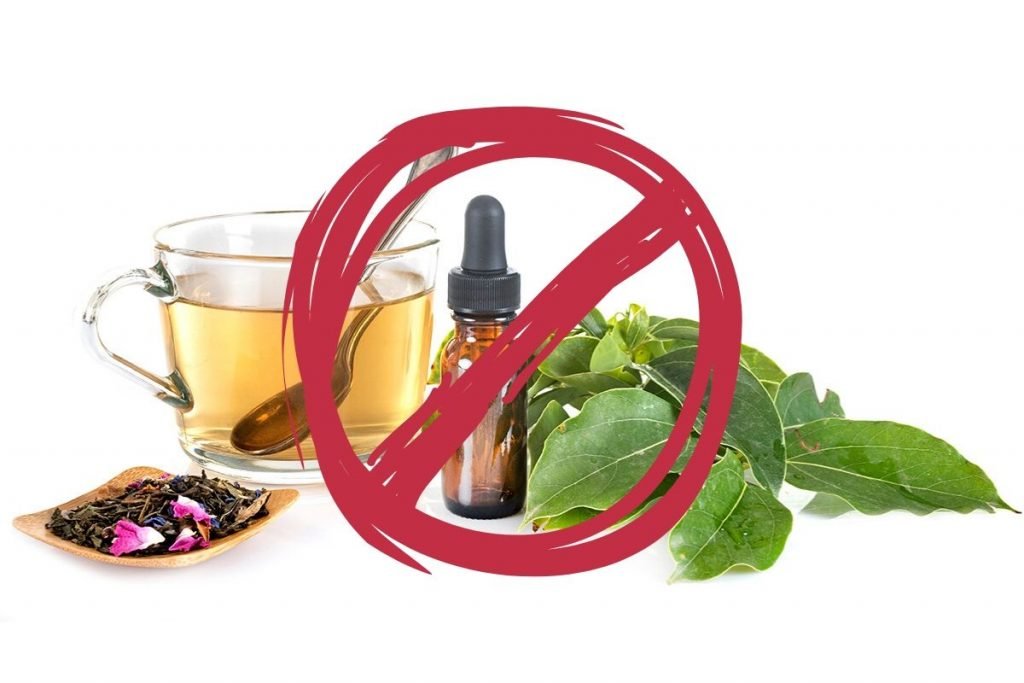
Ingesting essential oils is a controversial topic.
Most essential oil brands advertise the more conservative and safe way of using essential oils by saying to NOT ingest them. Some customer service answers I’ve received in the past state that their brand officially doesn’t recommend internal use, but that their consumers do so anyways at their own risk and while working with their healthcare team.
If you like a particular brand of essential oils, and would like to take them internally, I would recommend you search the FAQ or customer service database of your exact brand of choice really well to find some good answers on this question. You can’t go off of general information here as no such thing exists and no one-size-fits-all general approval to use oils internally exists in this industry.
For your convenience, I have included some other popular essential oil brands‘ statements on internal use of essential oils.
Rocky Mountain Oils

“Essential oils are very potent. Even though our oils are 100% pure, it is dangerous to provide information on ingestion because we do not have a complete understanding of your medical history, or know the medications you could be taking. Also, due to FDA regulations employees of an essential oil company are not allowed to provide answers to medically related questions. We recommend consulting with an independent aromatherapist or trusted health professional for guidance.”
Eden’s Garden
Initially published as a newsletter from Eden’s Garden & reprinted with permission.

When added to a drink or swallowed directly, essential oils come into straight contact with vital organs such as the tongue, mouth, esophagus, stomach, etc. Because essential oils are miscible with fats, they attach to the mucous membrane which lines these organs leading to irritation and possible damage.”
More Eden’s Garden specific internal essential oil use information can be found in this article here: Is It Safe To Ingest Eden’s Garden Essential Oils?
Plant Therapy
Excerpt from a blog post on www.planttherapy.com.

Further Considerations to Essential Oils Safety
In addition to the main questions on eating essential oils, here are a few more notes of what can help you use essential oils safely:
- Dosage: Harmful effects might arise when certain essential oils get used in the wrong doses or too high of a concentration. Remember, oils are highly concentrated and potent, so there is no need to use a lot of them. While one drop of a certain essential oil might not cause you problems or harms, an excessive dosage might. Always choose a conservatively low dosage to air on the safe side. This usually means just a few drops in your diffuser, and a few drops mixed into a massage oil only for example.
- Purity: Look for essential oil labeling that has language indicating 100% oil purity. You do not want any oils that have been altered by adding synthetic chemicals or other, similar smelling additives.
- Application method: Some essential oils may be safe when applied in one way, but not when used in a different way. For example, Thyme, oregano, clove and cinnamon bark oils are considered safe if used via inhalation, and yet may be irritating if applied to the skin, even mixed with carrier oils and in concentrations as low as 3-5%. As another example, several of the citrus oils (lemon, lime, bergamot, or orange) can cause severe burns or skin cancer (phototoxicity) if there is exposure to natural sunlight or sun-bed radiation following an application of the oil to your skin – but this would not result from inhaling the same oils.
- Possible drug interactions: There is very little research published on how essential oils react with pharmaceutical drugs. Given how chemically complex essential oils really are, a cross-reaction or sensitivity between classic pharmaceuticals and essential oils is quite possible if not likely. It is important to discuss essential oil use with your health care provider to ensure your health care team is fully in the loop of everything that goes on with your body at all times. Only this way can you properly assess any potential risks and benefits fully.
In Summary
In summary – personally – I never ever recommend ingesting essential oils – because ingestion of essential oils is NOT approved by the FDA. There are ways that certain companies market internal use, and it might very well work for some people. But while I love essential oils and their use in my daily life – I don’t ingest them or say that you can, should, or would be ok to do so.
If you choose to ingest essential oils, it is recommended that you only do so under the supervision of a licensed healthcare provider.
What about Lemon Essential Oil in my water?

What do you think? Agree? Disagree?
Let us know in the comments below! I look forward to reading your thoughts and being part of this discussion.
Further Reading
¹ FDA Statement on Aromatherapy Regulations
Young Living Essential Oils Safety Guide
Are essential oils safe? An article by the University of Minnesota

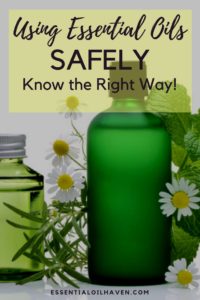

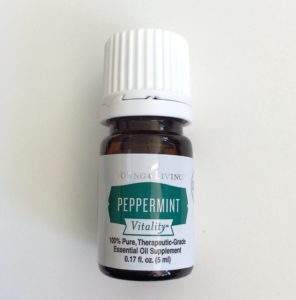
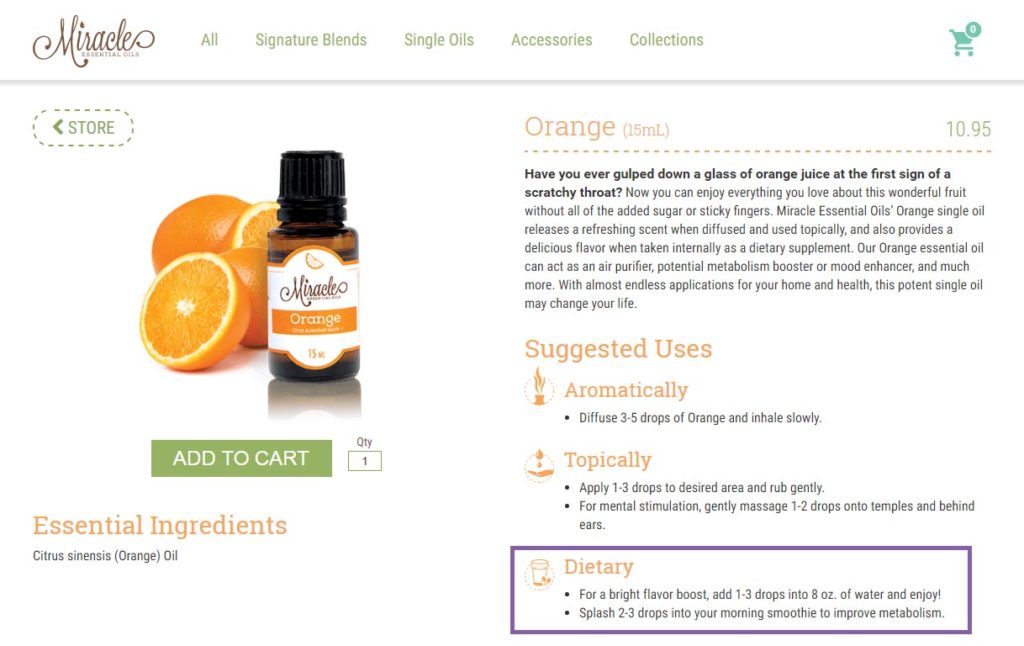
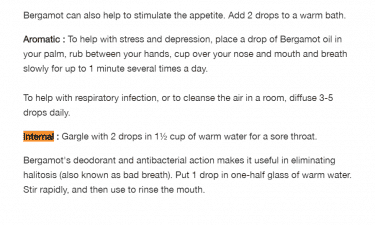

Two nights ago, I put a shot of vodka in my glass and decided to flavor it up with some Ginger Oil (Whole Foods brand). I put in several drops and later went to bed. I woke up the next morning with very sudden and severe flu-like symptoms. I had lower lung congestion and couldn’t inhale fully without coughing, all of my joints ached, I felt feverish, and had strong and frequent urges to urinate. I was concerned because of how sudden and severe these symptoms were, thought for sure I had the flu or something. I couldn’t sleep that night due to the pain and finally fell asleep at 3:30am. I woke up at my normal 8:30am and felt completely normal again, all symptoms gone. I’m convinced I poisoned myself and looked at the container and it says “Not for internal ingestion”. Yikes!! But the vodka tasted good, haha.
I have been using Eden’s Garden Frankincense EO for over a decade. I have also been ingesting their oil just as long. NO EO company can legally recommend that anyone ingest an EO and make medical claims of healing. The FDA would be all over them. It would be very expensive to fight that. I have ingested at my own risk. But I have also done my own research. I take zero pharmaceuticals–those nearly killed me. I make my own capsules with MCT or EVOO with Frankincense EO. For an awesome reference, I use “The Complete Book of Essential Oils and Aromatherapy” by Valerie Ann Worwood. She is a Clinical Aromatherapist and has a doctorate in complementary medicine. She has been Chairperson and Chair of Research for the International Federation of Aromatherapists, and as well as her involvement in essential oil research, she has acted as a consultant and expert on the clinical use of essential oils internationally.
Hello! Thank you so much for your insight. I love that book, too! I’ve had it on my list of recommended aromatherapy books since forever! So happy to hear you’re also a fan!
I throughly enjoyed reading all this information and I’m sure that I will go back and read it again. Everything was very informative, especially since I am new to all this essential oils stuff. Thank you so much for all this information.
This is an extremely helpful article. Thank you for putting this out there. As a newbie to oils, you read a lot, hear a lot, and get lots of opinions. It’s nice to have this information from someone that knows and loves oils for their intended purpose and that is for your health.
Again, thank you, this was very helpful information.
I’ve been using essential oils for several years but I use them in perfumes, soaps, and lotions. I DO know that buying from a reputable company is CRITICAL, to say the least! Some essential oils aren’t essential oils at all but chemically made to smell like the essential oil. These chemicals ARE NOT SAFE, especially for ingestion! I’m not sure about topical use, yet I stay away from them. I loved this article and I learned something new. When it comes to essential oils it seems there is ALWAYS something new to learn! Thank you for the essential oil links and your very well written report…
Just so we are clear……any EO company can put what ever the want on their label…Therapeutic, Ingestible, 100% Pure, and on and on. Just because they proclaim it and others don’t, does not mean they are inferior oils. It simply means they choose not to pay the fines and take a risk that customers will misuse their oils. It is loosy goosy in this industry.
Perfectly said, I agree with your comment.
This article is very clear and clarifies many concerns, my skin does not tolerate some oils from Doterra, it reacts with rash, inflammation and itching, I tried it with carrier oil and did not get results, there are oils that are not for me. I must always make a test in order to use them with confidence, but I am amazed with its use and I want to continue learning.
Great article, I liked reading what each of the different companies felt was the appropriate use of their oils with ingestion.
Thank you for writing such a clear and common sense article which is so helpful. I feel more confident using my own oils safely. I have had unqualified people recommend ingesting oils and it never sat well at all. Now I know now I was right to feel uneasy and can give a proper informed reply! Thanks again ??
The Canadian Federation of Aromatherapists says that not only should all essential oils absolutely not be injested at any time, but if you are a registered or certified aromatherapist and you tell someone that it’s okay or you do it yourself, you are breaking their code of ethics. It’s not safe.
Thank you everyone for your comments and support. It’s awesome to be having these open conversations with you all.
Word of warning. When I first started buying essential oils, I had read it was safe to put lemon oil in drinking water. I added one drop to my 16 oz bottle of water and liked it so I did it several times. Shortly thereafter I went to the dentist and was told I had tiny blisters on the roof of m mouth. I quit ingesting the lemon oil and it is about 10 months later, however, I still have problems with the roof of my mouth getting blisters and being sore. So I urge everyone to use fresh lemons only in your water. I didn’t think about oil and water not mixing in the beginning so it is like taking it undiluted.
Trish, since you haven’t used the lemon oil in 10 months and you still have blisters, maybe they aren’t caused by the oil.
Exactly. I mean, the condition you had might not be caused by your ingesting essential oil.
Sensitivity to oils persists even after you stop using them and can, over time, develop into a full blown allergy. Once the body reacts it tends to protect itself.
I agree with your statement about using a real fruit suc h as real, organic lemons, in water, rather than the essential oil. People need to remember that essential oils are concentrated essences that are thousands of times stronger than what occurs in nature. If a person adds essential oils to drinking water, they tend to float on the top of the water, and not blend in the same way as the juice or shaved peels would, meaning the person gets a very strong dose initially. Since that is bad on your skin, why do it to your esophagus?
I am a Clinical Aromatherapist who has been using essential oils since 1991, and I thank you for writing this article on such an important issue. I am so glad to see a resurgence in the essential oil industry and emphasis being placed into the quality of these oils by companies such as Young Living and Doterra, however I am concerned about the inadequate due diligence with regard to the safe use, and the contra-indications.
Because these are MLM businesses it is often an untrained person advising on the use of essential oils to other individuals, and although in a large number of essential oils this is not too much of an issue, there are some oils that need to be used with great care, and a few oils that I have seen marketed that are considered toxic for Aromatherapy use. I advise everyone to do research on oils they intend to use, not just using the information supplied by the company but independent research too, especially if you have a medical condition.
Thank you again for bringing this to the attention of the public
I take alot meds, some causing cancer and kidney failure. I have polysythemia vera,(blood), in remission from stage all CLL, numerous heart complications, a wound that won’t heal under my foot. Can essential oils help me maintain a better quality of life. Or at least help heal my wound?
Alicia – I am in total agreement with your post. We each need to do our own personal research based on why we’re using an oil and for what end result. Find out all you can and then make an intelligent decision.
That said, Emma has the most intelligent writing on oils I’ve seen in a long time – unbiased and well-researched. Thank you, Emma.
Thank you so much for clearifing the blending method, Really excited about my Essential Oils now, that I read this article.Looking forward to many good sleeping nights.
I can’t speak for other brands, but I add YL oils to my water every day. I use 4-5 drops of 3 or 4 different oils in the same bottle. Likewise with daily smoothies and occasionally i make pills by adding the oils to empty vegetable capsules. I would not recommend this for everyone as others might react differently. Brand, and the quality associated with it, is extremely important. As I have looked into what products may assist with things I want help with, I have changed up what I add. All I can say is that I feel great.
Great article. Very informative.
This is a great article. I think a lot of people using essential oils are not researching how to properly use each and every one. It’s nice to restate that essential oils are not stamped by the FDA. Essential oils can cause harm to some, and maybe not any side effects to others. Everyone is different. People need to remember that when they are sharing their oils. When I started using essential oils, I was applying it directly to my skin and not mixing it with a carrier. I definitely noticed a few side effects for myself. I researched it and immediately stopped applying it directly to my skin. I mix with a carrier oil or with a lotion. Thanks for posting this. I think it’ll help others.